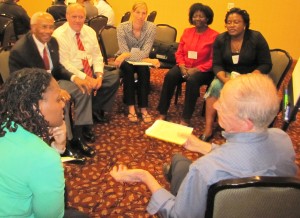Article by Edin Simms
When the average American is asked what they think are the causes of food insecurity around the globe, they might cite drought, pests, war, or poor government. What they may not realize is that the lack of an adequately trained agricultural workforce is one of the biggest constraints to achieving food security in developing countries. A Virginia Tech-led program working to improve education and training for agricultural professionals addressed this problem at an international symposium at the George Mason Inn in Fairfax, Virginia September 18-20.
The symposium brought together 150 stakeholders including government representatives, academic leaders, and development organization and industry representatives to discuss challenges facing agricultural education practitioners around the world. Over 45 international participants attended, and 25 countries were represented.
The symposium, Building Capacity for Agricultural Training and Education in Developing Countries, was the first public event of the Innovation for Agricultural Training and Education program, a U.S. Agency for International Development-funded project managed by Virginia Tech. The program is working to improve agricultural training programs around the world.
The symposium explored successful agricultural education and training interventions and identified strategies to meet capacity-building challenges. Key themes discussed at the symposium included gender equity, challenges in post-conflict environments, and rural youth workforce development.
Gender was a key part of the discussion, as presenters noted that in some countries as much as 50 percent of the farmers are women. “Intentionality is a key concept of incorporating gender successfully into agricultural training,” said presenter Andrew Gilboy, senior partner at Associates for Global Change, a consulting firm.

Father Mike Schultheis, vice chancellor of the Catholic University of South Sudan takes the lead in a discussion group.
The theme of agricultural training in post-conflict environments generated lively discussion among participants. Maria Mullei, a project representative for the Rebuilding Higher Education in Agriculture program in war-ravaged South Sudan, said that one of her key takeaways from the post-conflict discussions was how to deal with traumatization in students. Mullei stated, “In post-conflict countries you have to deal with more than just physical damage to the environment. People are traumatized and this traumatization affects every aspect of their lives. One thing agricultural education and training can offer students is empowerment. They can feel like a valuable part of their community and they can be included in an important aspect of rebuilding efforts in their country.”
Daniel Thomas Rukazambuga, dean of the faculty of agriculture at the University of Rwanda, said that he believed the general focus on technical vocational training was productive. He noted that the symposium’s emphasis on the importance of improving agricultural training at all levels and creating a paradigm shift to make this training more market-oriented was especially helpful.
The last day of the symposium was dedicated to a World Bank sponsored session which, by using Team-Africa as an example, helped participants learn how regional networks can be used to collaborate on AET capacity building.
Notable international presenters included keynote speaker Hans Van Otterloo of Wageningen University and Oumar Sock, director general of the Senegal Ministry of Higher Education. Notable local speakers included Guru Ghosh, vice president for Outreach and International Affairs at Virginia Tech, and Paul Weisenfeld, assistant to the administrator of the U.S. Agency for International Development Bureau for Food Security.
Tom Hammett, director of innovATE stated, “The symposium laid a solid foundation for building the AET Community of Practice. We look forward to facilitating the exchange of ideas in a community which has shown itself to be so energetic and engaged in AET and food security issues.”

